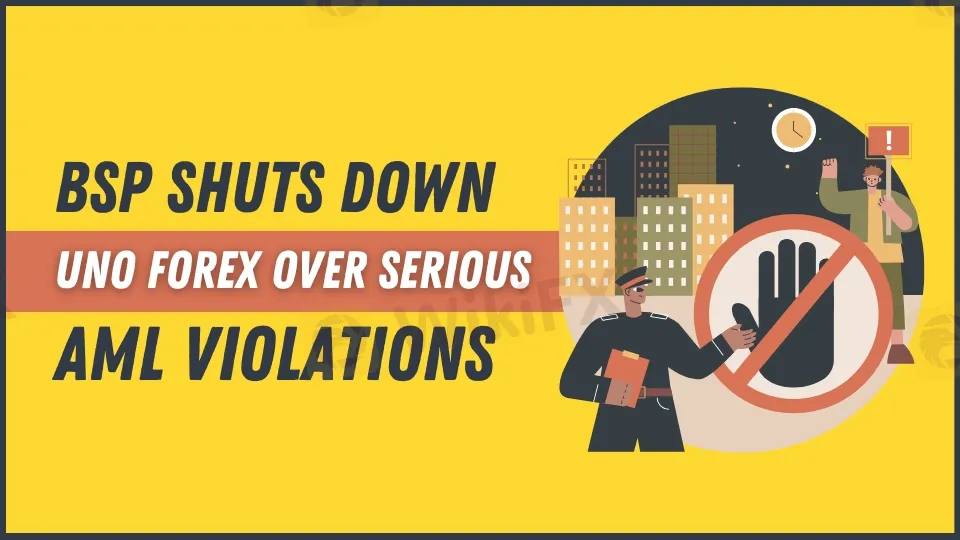简体中文
繁體中文
English
Pусский
日本語
ภาษาไทย
Tiếng Việt
Bahasa Indonesia
Español
हिन्दी
Filippiiniläinen
Français
Deutsch
Português
Türkçe
한국어
العربية
BSP Shuts Down Uno Forex Over Serious AML Violations
Abstract:BSP cancels Uno Forex’s Inc. registration, marking its fifth shutdown this year over failure to comply with anti-money laundering laws, raising concerns.

In a troubling move for the financial sector, the Bangko Sentral ng Pilipinas (BSP) has canceled the registration of Uno Forex Inc., yet another foreign exchange dealer found guilty of severe violations of anti-money laundering regulations. This decision underscores the increasing pattern of negligence among firms in the industry, with Uno Forex becoming the fifth company to be blocked from operating this year alone.
The BSPs Monetary Board cited “serious violations” of the Manual of Regulations for Non-Bank Financial Institutions and the Anti-Money Laundering Act of 2001, emphasizing that these breaches are not minor infractions but represent a significant failure to uphold the law. The latest shutdown follows a disturbing trend of non-compliance by money changers and foreign exchange dealers, leaving questions about how these firms were allowed to operate unchecked for so long.

Earlier in the year, the BSP revoked the registration of Foreignex Inc. and Nikko Foreign Exchange, both for similar anti-money laundering offenses.
In fact, this pattern of regulatory failure seems all too common, with Nikko Mart and Atomtrans Tech Corp. also losing their licenses for serious non-compliance. The fact that five firms have now been shut down in 2024 alone raises serious concerns about the effectiveness of the BSPs oversight.
While the BSP argues that its actions are meant to preserve the integrity of the financial system, it begs the question: how did these companies manage to operate for so long without facing any consequences? With lax enforcement and repeated violations by multiple institutions, the central banks regulatory framework seems to be failing in its core responsibility—preventing illegal activities within the financial sector.
The BSPs cancellation of Uno Forex's registration is a reminder that the financial system in the Philippines is still vulnerable to criminal misuse, and much more stringent oversight is needed to prevent further damage.
Final Thoughts
The BSPs repeated shutdowns of firms due to non-compliance with anti-money laundering regulations highlight a disturbing pattern of regulatory failure. If the central bank is serious about its mission to protect the financial system, it must take stronger, more proactive measures to ensure compliance before the damage is done, rather than cleaning up after the fact.

Disclaimer:
The views in this article only represent the author's personal views, and do not constitute investment advice on this platform. This platform does not guarantee the accuracy, completeness and timeliness of the information in the article, and will not be liable for any loss caused by the use of or reliance on the information in the article.
Read more

Authorities Alert: MAS Impersonation Scam Hits Singapore
MAS scam alert: Scammers impersonate officials, causing $614K losses in Singapore since March 2025. Learn how to spot and avoid this impersonation scam.

Billboard Warns of Crypto Scams Using Its Name – Stay Alert!
Billboard warns against fake crypto scams using its brand. Learn how to spot fraud and protect yourself from fake promotions.

The Impact of Interest Rate Decisions on the Forex Market
Interest rate changes determine currency attractiveness, influencing capital flows and exchange rate trends. Understanding this mechanism helps investors navigate the forex market effectively.

Rising WhatsApp Scams Highlight Need for Stronger User Protections
UK consumers lose £2,437 on average to WhatsApp scams. Revolut demands stricter verification and AI monitoring to combat rising fraud on Meta platforms.
WikiFX Broker
Latest News
TradingView Brings Live Market Charts to Telegram Users with New Mini App
Trump tariffs: How will India navigate a world on the brink of a trade war?
Interactive Brokers Launches Forecast Contracts in Canada for Market Predictions
Authorities Alert: MAS Impersonation Scam Hits Singapore
Stocks fall again as Trump tariff jitters continue
INFINOX Partners with Acelerador Racing for Porsche Cup Brazil 2025
Regulatory Failures Lead to $150,000 Fine for Thurston Springer
April Forex Trends: EUR/USD, GBP/USD, USD/JPY, AUD/USD, USD/CAD Insights
March Oil Production Declines: How Is the Market Reacting?
Georgia Man Charged in Danbury Kidnapping and Crypto Extortion Plot
Currency Calculator








